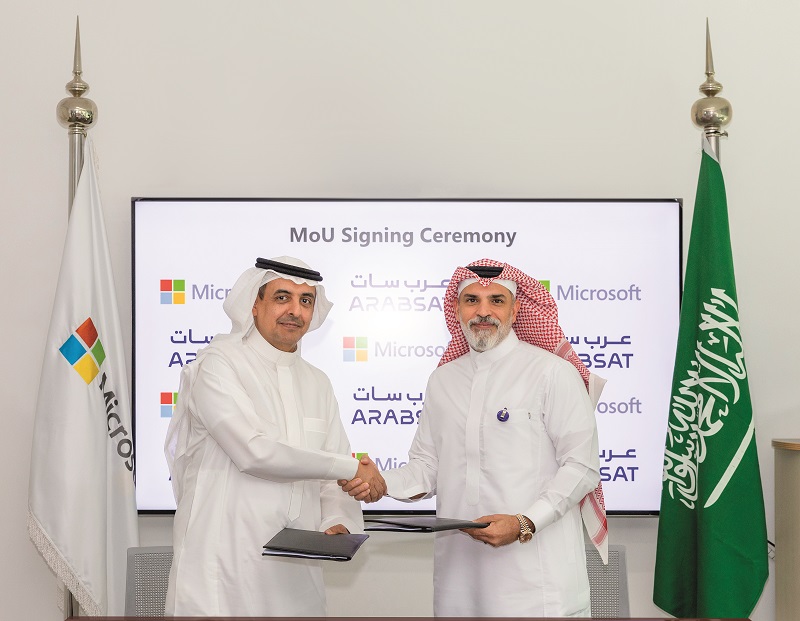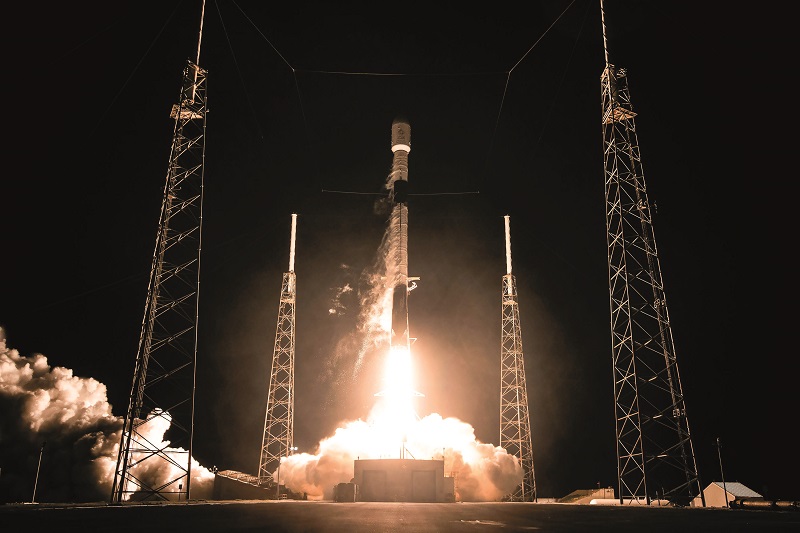A year ago, Eng Alhamedi Alanezi assumed the role of President and CEO at Arabsat, charting a new course for transformative growth and innovation at the company. Under his guidance, Arabsat introduced a revamped brand identity in September, aiming to reposition the company as a satellite solutions provider offering unique value across various industries. In an interview with BroadcastPro ME, he discusses the changes at Arabsat and his vision for the company.
Arabsat has long played the traditional satellite operator’s role in the Arab world to perfection. But new CEO Eng Alhamedi Alanezi is determined to alter the traditional perception, modernise the company and elevate it to new heights. One of the areas he addressed when he took the helm at Arabsat was changing the company’s brand identity.
“We are in a race to be the key player in the region. With technology advancing rapidly, we need to grow at the same speed. Until we reach that stage, we will remain in a state of transformation,” he remarks.
Part of this transformation has been addressing gender and cultural diversity within the organisation and recruiting more young talent.

“The entire concept behind rebranding Arabsat was to adopt a more human-centric approach. As part of that, we are focused on empowering women. We recently hired approximately six women and plan to hire more. Market demands are evolving so fast that they require fresh expertise. So we’re not only hiring women but also sourcing experts from different countries. Currently, we have experts from Portugal, France, various parts of the Arab world, India and Pakistan, to name a few. The more diverse our team is, the better we can accommodate the new vision and approach of Arabsat.”
Alanezi is also committed to hiring more young professionals from different Arab countries to help develop the space industry. “We are hiring new graduates whom we can train and nurture. We are engaging with Arab youngsters and encouraging them to consider careers in the space industry. With this goal in mind, we’re working to establish a space camp in Indonesia and hosted one previously in Tunisia.”
Alongside this, Alanezi hopes to change people’s perception of what Arabsat can offer.
There is a misconception that our satellites mainly focus on broadcasting and TV. However, we are involved in many other areas. For instance, ensuring connectivity is a core part of Arabsat’s business, particularly in rural areas to promote fairer distribution of broadband. We have successfully provided connectivity to schools in remote areas for e-learning. We completed a similar project in Saudi Arabia recently.

“We offer multiple layers of solutions, services and commitment to the communities we serve. This is why we’re changing everything, from our hiring practices to our public image and our message to the community at large. We want everyone in the Arab world to feel that Arabsat is a part of them.”
He explains that each community will be serviced based on its needs. “We tailor our services to meet the unique needs of each market. Market needs differ in Mauritania from those in Algeria, Tunisia or Saudi Arabia. One project that many Arab countries face challenges with is desert expansion, and we’re offering a monitoring service that provides analytical data to help them make informed decisions about managing this issue. With this service, we have assisted Saudi Arabia in planting trees as part of the Saudi Green Initiative, helping identify optimal locations within the Empty Quarter. Similarly, we assist with tasks like monitoring water quality along the Nile or addressing oil spills in Algeria.”
Arabsat’s strategic vision for the future centres on key pillars that include a strong focus on enhancing connectivity for the Arab world, investing in new satellite technology and expanding data services to meet evolving market needs.
He stresses the operator’s ongoing satellite initiatives, notably the launch of Badr 8 in May 2023. Arabsat also has Badr 7A and Badr 9 in the pipeline, set to be operational between 2027 and 2028/29.
“We are one of the few satellite operators that have a backup satellite in orbit. In case one has issues, we can seamlessly transition our customers between the primary and backup satellites,” he explains.
Several new initiatives have been announced in the last year. For one, the operator strives to enrich its broadcasting services to facilitate mutual promotion between its 600 partner TV channels. For this, it has encouraged channels to create three-minute videos highlighting their countries with the aim of cross-promoting them.
Secondly, Arabsat has started providing training and certification services to people working for the TV channels on its platform. While these services are optional, Alanezi says they empower Arabsat’s clients to deliver top-notch content and be cognisant of the latest developments.
A third initiative is the Arabsat Advisors’ team, comprising seasoned satellite professionals. Their role is to advise channels on entering new markets, distinguishing between linear and streaming services based on market suitability, target audience and commercial viability. This on-demand advisory service is meant to reinforce clients’ presence in the market.

Another initiative that Arabsat is now promoting is its Disaster Recovery (DR) centre in Cyprus, extending assistance to clients who want to have such an option.
“Essentially, I want the industry to know that we are not just selling capacity but are here to enable knowledge transfer and improve the quality of services through these various initiatives. In this way, we nurture sustainable client relationships and improve market preparedness. If we are developing an advanced satellite but don’t have a highly skilled customer that can understand where it can take them, we will continue to remain in the same traditional space until the market matures and grows. But if your customers are well-informed, we will together move to the next level of knowledge and experience, and all of us will be able to maintain the same advanced pace. I will have the tools they need to work at that advanced level, and they will have the ability to maximise its potential. This also creates stability in the market. When experts leave, the entire organisation doesn’t crumble; many resources will be capable of maintaining and delivering services to customers.
“Currently, technological expertise varies depending on the region. To address this, we have collaborated with partners and hired advisors from different countries where space technology is more advanced, to provide knowledge transfer to our customers. This makes it a win-win for us and our customers.”
He concedes that the broadcasting industry is undergoing significant transformation, shifting from traditional linear services to data-centric offerings, and explains how Arabsat has worked to address this for its customers.
“There’s a decline in linear and more traction on the OTT side of the business, but we have a challenge in the Arab world because we are all at different levels of readiness. Arabsat therefore has services that address both linear and OTT needs now. Within broadcast, our strategy has been to develop multiple services and solutions so we can offer the customer a range from conventional offerings all the way to those for newer platforms. So if the channel decides to continue with linear, or if they reduce their participation in linear and move to OTT, we are there for them either way. Secondly, we have already invested and developed solutions that reduce the investment on the customer side so they don’t need to make additional investments. They merely need to plug their channel in, utilise the solution, pay and go.”
For some of the tech initiatives above, Arabsat has signed a memorandum of understanding (MoU) with Microsoft Arabia to accelerate its digital transformation and enable the development of its services. Arabsat will use Microsoft’s cloud services to improve its performance efficiency, and increase productivity and reduce costs. It will also use Microsoft’s latest technologies to enhance the digital capabilities of its own employees. The partnership aims to focus on developing value-added and quality services that combine Arabsat’s space expertise with Microsoft’s technological capabilities to develop infrastructure, adopt cybersecurity solutions and build digital capabilities, so countries that are part of its remit can make the most of what both companies have to offer.
The MoU is also set to establish an innovation laboratory to develop new products in the satcom sector, as well as environmentally sustainable solutions that rely on cloud and satellite technologies to collect and analyse important environmental data. This will provide Arabsat with new tools for exploring climate change, weather forecasting and environmental monitoring.
Arabsat also announced the launch of a Contribution Platform last month, designed to simplify global content sharing for TV channels. It accommodates industry-standard video formats and networks, empowering TV channels and channel groups to broadcast from their studios to a global audience. The operator anticipates this platform will transcend traditional limitations and facilitate seamless content delivery to global audiences. As part of this project, Arabsat has forged partnerships with TVU Networks and Zixi. The former will help deliver cloud-based production and playout services while Zixi’s software-defined video platform will help provide secure, low-latency, cost-effective and high-quality video delivery over any network.
“We are rapidly engaging with industry partners while also making dynamic shifts within the company to expedite ongoing transformations, protect our assets, and elevate the skills and knowledge of our employees. Our goal is to drive development within the communities we serve. By addressing these challenges, Arabsat is poised to maintain its position as a key player in the satellite industry while fostering growth, sustainability and technological advancement,” concludes Alanezi.

















































































